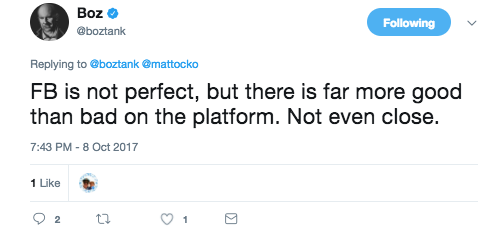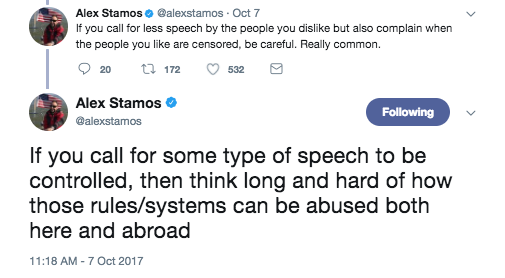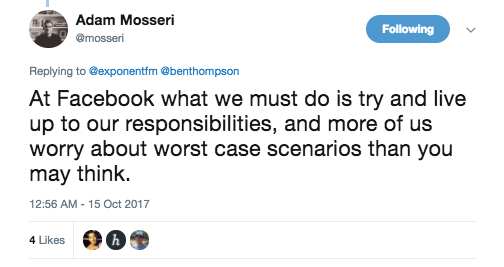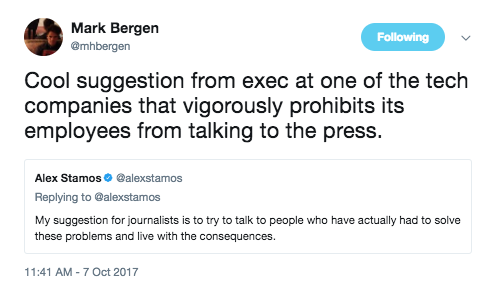
As Facebook grapples with the unprecedented crisis that's arisen around its role in the 2016 US presidential election, some of the company's top executives have begun doing damage control on an unlikely platform — Twitter.
In recent weeks, these executives — Facebook Chief Security Officer Alex Stamos, VP of augmented and virtual reality Andrew Bosworth and News Feed chief Adam Mosseri — have been engaging in public and sometimes heated discussion on Twitter, sounding off in what has been a largely Facebook-antagonistic conversation about Russia's effort to use the company's platform to undermine American democracy.
Facebook's leadership has long ignored Twitter — Mark Zuckerberg last tweeted in 2012 and Sheryl Sandberg in 2013 — and its decision to do so has essentially freed reporters, academics and the general public to criticize and lambast the company unchallenged by those who know it best. Now, with Facebook executives wading deep into a particularly fraught Twitter discussion, it's clear the company has begun to view it as a tool critical to shaping public perception. Facebook might prefer to ignore Twitter, but it can't afford to do so when a conversation shaping how people perceive its most grave crisis is unfolding there.
“Journalists spend an outsized amount of time on Twitter often using it to formulate their stances somewhat out in the open,” Bosworth told BuzzFeed News. “I thought participating in some small way could add some balance, but for the most part I'm just representing in context points FB has already talked about through official channels.”
Though the three Facebook executives have been on Twitter for years, their concerted effort to shift public perception by using the product is new. Their Twitter offensive is a tacit acknowledgement of the platform's influence, Facebook's inability to crack news via its own platform (an exclusive Facebook Live Axios interview with Sandberg about the Russia ads netted only 33,000 views) and a clear indication that they view Facebook's current crisis with grave concern.

Stamos' tweets have attracted the most attention — particularly his 18 part tweetstorm cautioning Facebook's critics to be careful what they wish for. But he and his two colleagues have thoughtfully engaged the public on Twitter, offering counterpoints to criticism of Facebook, of which there is many.
“Impact of fake news/Russia still being explored but I believe it was marginal, even in a close election.”
Mosseri, for instance, disputed the notion that Facebook is blind to the downsides of its products: “More of us worry about worst case scenarios than you may think,” he wrote. And Bosworth argued that the Russian ads and fake news didn't significantly impact the 2016 election. “Impact of fake news/Russia still being explored but I believe it was marginal, even in a close election,” he wrote.

Meanwhile, Stamos cautioned people to consider the potential side effects of the changes they are demanding of Facebook. “A lot of people aren't thinking hard about the world they are asking [Silicon Valley] to build,” he said. “When the gods wish to punish us they answer our prayers.”
The Facebook executives' Twitter blitz hasn't come without hiccups. Bosworth has been criticized for his blunt demeanor and Stamos has scolded journalists for not talking with people in the thick of the issues they cover, while seemingly forgetting his company would likely discipline those people for talking to journalists.

Still, the added candor from Facebook — whose employees are so well media trained they often speak in PR bullet points — is a welcome change for observers of the company. “These are important questions from Facebook's chief security officer—and no critic of Facebook or Google (hi, me!) should dismiss these,” academic and fierce Facebook critic Zeynep Tufekci wrote in response to Stamos' tweets.
It's worth noting that these frank Twitter conversations — a departure from Facebook's typically cautious communications strategy — are not being orchestrated by the company's PR team, according to Bosworth. “We’re engaging in our own way on the areas we care about and where we have expertise,” he told BuzzFeed News. “Yes, the PR folks are aware, but we are generally doing this on our own because we want to be more direct and straightforward as a company.”
Bosworth declined to say whether he and his colleagues plan to tweet like this from now on — though there likely will be plenty more opportunities for such engagement as Facebook heads toward open hearings with both the House and Senate Intelligence Committees in early November. “It is an experiment,” he said. “I may or may not continue depending on how it goes.”
Quelle: <a href="Facebook Executives Find A New Crisis Communications Tool: Twitter“>BuzzFeed

Published by